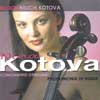Bloch; Bruch; Kotova Cello Concertos
A virtuoso provides a colourful and idea-filled concerto for herself
View record and artist detailsRecord and Artist Details
Composer or Director: Nina Kotova, Max Bruch, Ernest Bloch
Genre:
Orchestral
Label: Delos
Magazine Review Date: 4/2003
Media Format: CD or Download
Media Runtime: 64
Mastering:
Stereo
DDD
Catalogue Number: DE3305

Tracks:
| Composition | Artist Credit |
|---|---|
| Schelomo |
Ernest Bloch, Composer
Constantine Orbelian, Conductor Ernest Bloch, Composer Nina Kotova, Cello Russian Philharmonia |
| Concerto for Cello and Orchestra |
Nina Kotova, Composer
Constantine Orbelian, Conductor Nina Kotova, Composer Nina Kotova, Cello Russian Philharmonia |
| Kol Nidrei |
Max Bruch, Composer
Constantine Orbelian, Conductor Max Bruch, Composer Nina Kotova, Cello Russian Philharmonia |
Author: DuncanDruce
It is a long time since instrumental virtuosi were expected to provide much of their own repertoire. Though it was a tradition that often produced very trivial music, the high points – from Vivaldi to Wieniawski, from Boccherini to Popper – gave us works that, because of their close relationship to the characteristics of outstanding performers, have a special individuality.
It’s good to see that at least one virtuoso cellist is keen to revive the tradition, and if Nina Kotova’s Concerto doesn’t put her alongside Rachmaninov or Paganini, it does provide some very colourful music that admirably suits her qualities as a player – her flexible expressive style, beautiful tone throughout the cello’s range, and an impressively dextrous, confident manner of delivery. The trouble with this ambitious concerto, in my view, is its diffuseness; there are plenty of ideas, but they are rarely brought into focus so as to produce a strong continuous effect. By far the best music comes towards the end of the slow movement when earlier ideas recur, transformed to an atmosphere of eerie stillness. Here, Kotova dares to play extremely quietly, with a strikingly husky tone.
The companion works by Bloch and Bruch fare well. One has heard more powerful accounts of Schelomo, but Kotova, advantageously balanced, does not need to project more strongly. In Kol Nidrei, her rhythmic freedom when the main theme is first stated threatens to distort the music’s flow. Thankfully, this doesn’t continue, and her beautiful, restrained playing in the final major-key section is most affecting. Here the orchestra produces a lovely rich, soft sound and, throughout, Orbelian directs in a very positive, lively manner.
It’s good to see that at least one virtuoso cellist is keen to revive the tradition, and if Nina Kotova’s Concerto doesn’t put her alongside Rachmaninov or Paganini, it does provide some very colourful music that admirably suits her qualities as a player – her flexible expressive style, beautiful tone throughout the cello’s range, and an impressively dextrous, confident manner of delivery. The trouble with this ambitious concerto, in my view, is its diffuseness; there are plenty of ideas, but they are rarely brought into focus so as to produce a strong continuous effect. By far the best music comes towards the end of the slow movement when earlier ideas recur, transformed to an atmosphere of eerie stillness. Here, Kotova dares to play extremely quietly, with a strikingly husky tone.
The companion works by Bloch and Bruch fare well. One has heard more powerful accounts of Schelomo, but Kotova, advantageously balanced, does not need to project more strongly. In Kol Nidrei, her rhythmic freedom when the main theme is first stated threatens to distort the music’s flow. Thankfully, this doesn’t continue, and her beautiful, restrained playing in the final major-key section is most affecting. Here the orchestra produces a lovely rich, soft sound and, throughout, Orbelian directs in a very positive, lively manner.
Discover the world's largest classical music catalogue with Presto Music.

Gramophone Digital Club
- Digital Edition
- Digital Archive
- Reviews Database
- Full website access
From £8.75 / month
Subscribe
Gramophone Full Club
- Print Edition
- Digital Edition
- Digital Archive
- Reviews Database
- Full website access
From £11.00 / month
Subscribe
If you are a library, university or other organisation that would be interested in an institutional subscription to Gramophone please click here for further information.




